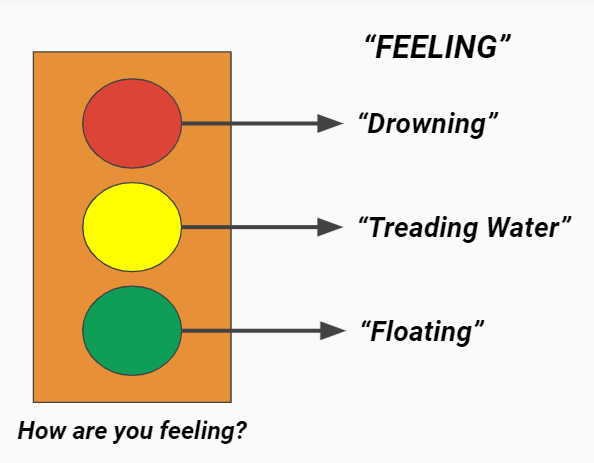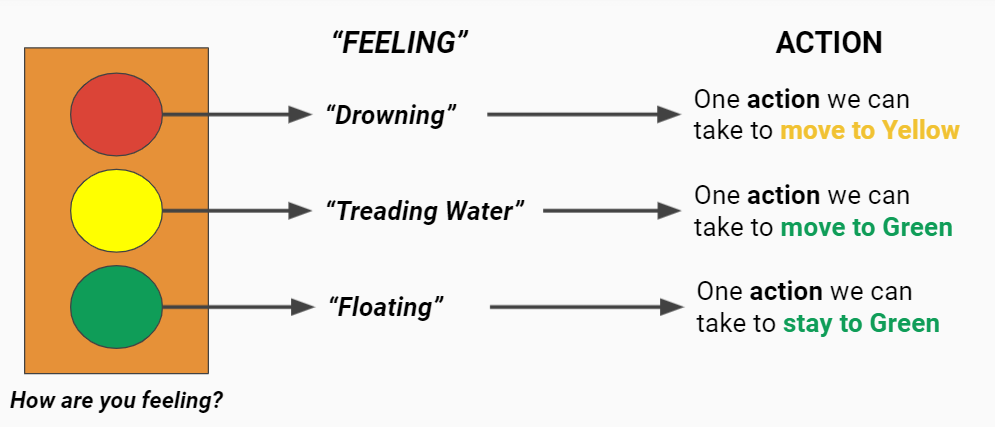The Mental Health Traffic Light can be a powerful tool we can use to have supportive Mental Health conversations in sales. Before diving into what it is, we first need to explore some neuroscience to learn why they are helpful.
To do this, we need to start by asking ourselves a question:
Do you ever find yourself at a loss for words when you get really upset or feel overwhelmed?
When I asked this question to my audience on LinkedIn, I received a handful of comments and direct messages. From these responses it was clear that this is a very common feeling for salespeople who face constant pressures to perform at a high level.
This post will help you learn why you lose your words, what you can do to get them back and how a Mental Health Traffic Light can make it easy to check in on partners, peers and direct reports.
The Left Brain and Right Brain Balancing Act
To answer this question, it’s best to defer to Dr. Bessel Van Der Kolk, who wrote an incredible book called The Body Keeps The Score.
He explains how under a normal circumstance, like catching up with a friend, your Left and Right Brain are working together to process and memorize this experience.
Your Left Brain is responsible for using words to communicate with your friend, it’s storing facts about the conversation and organizing everything into a logical sequence of events.
Your Right Brain on the other hand is more intuitive, spatial and emotional. It’s communicating through body language, mimicking your friend and recording the sensations and emotions you’re seeing/feeling moment by moment.
Later, if you were to recall this experience with your partner, you’d be able to tell him/her how it went with your friend using your Left Brain; while visualizing images of your friend and reliving some of the emotions you felt earlier using your Right Brain.
Why do I lose my words when I feel upset?
Under extreme situations like when we feel really angry, overwhelmed or feel in danger, we lose this balance between Left and Right Brain.
Losing this balance means we lose our ability to communicate using words and vocabulary.
This is because research has shown that a particular region of the Left Brain called the Broca Area, starts to go offline when we experience events that we perceive as dangerous, hurtful or threatening. Events which spike our stress levels.
For those who don’t know, the Broca Area is one of the main speech-related centers in the brain. It helps us put our thoughts and feelings into words.
Without a functioning Broca Area, we’ll be unable to effectively communicate how we’re feeling. This means we might default to physical responses like crying, cringing, punching, sweating or impulsive yelling.
When someone asks us “What’s wrong?”
We will likely only be able to muster out basic vocabulary and explanations like…
“I don’t know…”
“I’m fine…”
“I hate you…”
“F*ck off…”
“I’m upset… but don’t know why…
Enjoying This Post? Learn How to Thrive Under Pressure and Hit President’s Club
How do I find my words again?
One of the best things you can do when you’re feeling this way is stop and control your breathing.
When we’re feeling overwhelmed or upset, our breathing will be much quicker than normal. As a result, our heart rate will speed up.
These physiological responses (faster breathing and heart rate) in your body will be telling the speech centers in your Left Brain to stay turned off.
The good news is your breath is always something you can control – even when you’re upset. By slowing down your breathing, you can help turn on the speech centers in your Left Brain.
Think of your diaphragm and lungs as an internal gear shift that you can use to change how you’re feeling. Taking big short inhales (like when you’re running) will speed your heart rate up, while taking big long exhales will slow your heart rate down.
Therefore, if you ever feel yourself at a loss for words, you want to focus on lengthening your exhales using this exercise for 3-5 minutes:
Inhale through your nose for 4 seconds and exhale through your mouth more forcefully for 6 seconds.
Dr. Andrew Huberman also shares a variation of this method called the Physiological Sigh. Research at his lab has determined that the Physiological Sigh is the most effective way to shut off our stress response. You can learn how to do it in this video here.
Sales Leaders Need To STOP Demanding Answers From Struggling Sales Reps
To the leaders reading this, if someone on your team is really upset or overwhelmed today, don’t expect them to tell you why and don’t pressure them for an answer.
It won’t work and will only make things worse.
Best thing you can do is to go through this breathing exercise together (you’ll probably need it too) and help them get their Broca Area back online by lowering your stress levels.
Once both your Left Brain and Right Brains become more balanced, then you can start to have a proper conversation about what happened and problem solve a solution.
I can tell someone on my team is upset but they won’t or can’t tell me why. As a leader what do I do?
You might not have picked up on this earlier, but the Right Brain is more emotional and responsible for visual perception. This means it communicates using visual images and feelings.
As we already learned, if we ask someone “how are you feeling” they’ll be unlikely to communicate an answer using their vocabulary.
We can overcome this blockage in communication by presenting their Right Brain with a visual image they can point to in the form of a Traffic Light.

Enjoying This Post? Learn How to Thrive Under Pressure and Hit President’s Club
We can also make it easier for that person to communicate by presenting them with colour descriptions that help them label what they are feeling. Using words associated with water can be helpful because they are physical sensations/ feelings most of us can relate to from a very early age.
- Drowning = I need help ASAP.
- Treading Water = I can barely keep my head above water and can’t stay here forever.
- Floating = I’m relaxed, calm and feel good overall
This is another great article that helps provide more vocabulary, words and meaning to each colour of the Mental Health Traffic Light.

Mood Follows Behaviour
I’ve written about this before but in the famous words of Rich Roll: “Our Mood follows our Behaviour.”
Once we have a better idea of how our friend, partner or peer is doing…
We need to find an action we can each take, that will help them change the colour of their Mental Health Traffic Light.
These actions can range from taking a Mental Health Day, adjusting metrics, going for a walk or simply sitting together and using the breathing exercise mentioned above, before having an honest career pathing discussion.
Journaling and working on their emotional literacy can also be helpful actions individuals can take. The more accessible language/vocabulary becomes, the easier it gets for a partially offline Broca Area to find the words it needs to describe how you are feeling. In turn, you’ll feel calmer, safer and more in control of what you’re feeling.
Now, it’s naïve to think that one tiny action will create a monumental shift in mood (Red to Yellow); but that’s not the point of choosing an action together. The purpose is to interrupt the pattern of negative thinking/feeling and start shifting momentum in the right direction.
Learning to execute on the right micro-actions consistently, will lead to macro changes in mood over time.
If you’re a leader, try working this Mental Health Traffic Light into 1-on-1 conversations with reps and peers. It can be an effective way to offer support and empower reps to learn what actions will help them manage stress effectively.
More Strategies, Tips and Tools To Support Mental Health In Sales
If you found this post helpful, you may want to consider checking out our new book; Stress Less, Sell More: 220 Ways to Prioritize Your Well-Being, Prevent Burnout and Hit Sales Target. We have also created various training services you can explore by clicking the link below.
Both the book and training options are packed full with this type of information.
Learn How to Thrive Under Pressure and Hit President’s Club
About The Author

Jeff Riseley is currently the Founder of the Sales Health Alliance and Mental Health Advocate. With over a decade of sales experience – Jeff understands the importance of Mental Health in achieving peak sales performance.
Jeff combines his sales and Mental Health expertise to improve sales performance through mental health best practices. His strategies have helped sales teams become more motivated, resilient and better equipped to tackle stressful events within sales.





1 Comment
Pingback: Feeling Stressed In Sales? Try This. - Sales Health Alliance